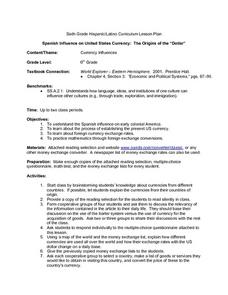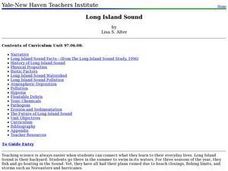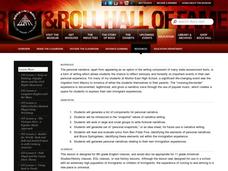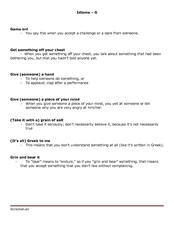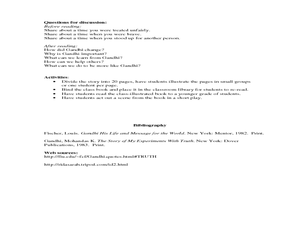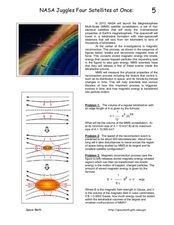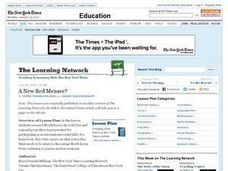Curated OER
Wolf Fact Cards
Students write a non-chronological report about wolves. They read and discuss wolf fact cards in small groups, complete a KWL chart, observe the teacher model the steps of writing a report, and conduct research and write an original...
Curated OER
Spanish Influence on United States Currency: The Origins of the "Dollar"
Sixth graders research the Spanish influence on early colonial America and the process of establishing the present U.S. currency. They read and discuss an informational handout in small groups, and take a short quiz. Students then...
Curated OER
Western Expansion or Eastern Invasion?
Fifth graders read from their textbook a story about the pioneer settlement of the Western Frontier. They review the pioneer standpoint, but also discuss how the Homestead Act of 1862 affected Native Americans. They write another story...
Curated OER
A Life to Remember
Students test and discuss their ability to remember events in their recent and past history and reflect on cases of dissociative fugue and amnesia. They graph and analyze data to look for patterns in the ability to recall a list of...
Curated OER
Vocabulary
In this grammar instructional activity, students complete 10 problems by reading a list of four words and circling the animals. Animals include cat, elephant, dog, and fish.
Curated OER
Are You Emotionally Smart?
In this emotional intelligence worksheet, students read 10 situations or problems, with 3 possible solutions with a missing word in each. Students fill in the three missing words and then check the solution that they would most likely use.
Curated OER
Back to School Crossword
In this language arts worksheet, students read 43 clues pertaining to school and fit the answers into a crossword puzzle. There is no word bank.
Curated OER
Presentation of Quantitative Data- Vertical Line Diagrams
In this quantitative data instructional activity, students examine how vertical line diagrams can be used to display discrete quantitative data. They read about the use of tally charts to create vertical line graphs that display the...
Curated OER
Student Exploration: Mineral Identification
In this mineral identification worksheet, students read nine vocabulary words and answer 5 short answer and fill-in-the-blank questions regarding minerals. There are four additional pages of related activities.
Curated OER
Point of View, Motivation, Traits and Feelings
In this point of view, motivation, traits and feelings worksheet, students answer 10 multiple choice questions in an online format. They read short scenarios and choose the best answer. They check their answers at the end of the quiz.
NASA
Benford's Law
In this Benford's Law learning exercise, high schoolers read about the first digit frequency of numbers. Students solve 3 problems about sunspot numbers, solar wind magnetism and the depth of the latest earthquakes by using on line sites...
Curated OER
Long Island Sound
Learners use the Internet to research the history of Long Island Sound. In groups, they identify the sources of point and nonpoint pollution and how humans are impacting the area. After watching a video, they discuss the role of...
Curated OER
Food's Altered Ego
Students write in their journals where they believe food comes from. After reading an article, they examine the proceses of cultivation and sale of genetically modified foods. Using the internet, they research specific countries and...
Curated OER
Had To vs. Must Have
In this had to vs. must have worksheet, students read for information and fill in the blanks with had to or must have plus a past participle.. Students complete six sentences.
Curated OER
A Personal Narrative on the Immigration Experience
The students create a personal narrative on their experiences with immigration. In this lesson, students are asked to read and understand examples of narrative writing as well as evaluate lyrics from Ben Folds Five to determine elements...
Curated OER
Idioms - G
In this recognizing idiom usage worksheet, students read idioms with explanations of their meanings and then use them to give advice or answers as responses to the people's comments. Students write 7 answers.
Curated OER
Mohandas Gandhi: Changing the World One Step at a Time
Students illustrate pages of a book. In this famous historical icon lesson, students are read a story about Mohandas Gandhi, illustrate the pages in small groups, assemble a class book to read to younger students, and act out a...
Curated OER
Earthquakes
After reading an article on earthquakes and tsunamis, students answer a series of multiple choice questions about what they have learned. All answers can be found within the article, making this a good way to prepare for reading...
Curated OER
NASA Juggles Four Satellites at Once
In this NASA satellites worksheet, students read about the Magnetosphere Multi-Scale satellite constellation that NASA will launch in 2013. They solve 4 problems including finding the volume of the MMS constellation, finding how long it...
Curated OER
Class Store
First graders explore economics by participating in a group activity. In this commerce lesson, 1st graders conduct a role-playing activity in which they utilize goods and services to re-enact a general store's daily business. Students...
Curated OER
The Science of Addition
Students examine the science of drug addition. In this health related lesson, students take a pre-assessment about drug addiction, then read and discuss an article about how some drugs affect the brain to cause addition. They will...
Curated OER
A New Red Menace?
Students research and analyze the current political situation of North Korea. They read and discuss an article, conduct research, participate in a simulation of an international round table, and write a response essay.
Curated OER
Categorizing Celestial Objects
Students work together to develop a classification system for planets. They take a class vote and read an article about an astronomer's classification system. They write an essay on how scientists make decisions for the general public.
Curated OER
What's For Dinner?
Students share their own views on eating genetically altered foods. After reading an article, they research any issues concerning these types of foods in the United States. In groups, they create a campaign slogan to help gain funding...

